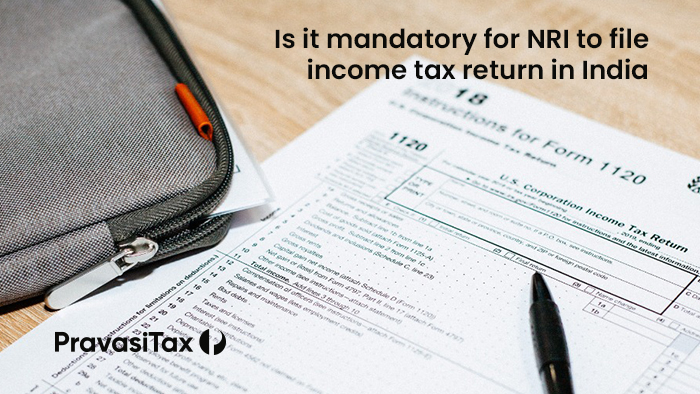Information Hub/Compliance/Tax Return
6 Major Benefits of Filing Income Tax Return in India
Published : 15 Nov 2021
 Income Tax Law requires every person to file his return of income in India, if the total income of such person exceeds the basic exemption limit. For NRIs, it is mandatory to submit income tax return in India only if his total income for the previous year has exceeded the maximum amount not chargeable to tax. The threshold limit for Financial Year 2020-21 and 2021-22, for individual tax slab exemption is INR 250,000.
Income Tax Law requires every person to file his return of income in India, if the total income of such person exceeds the basic exemption limit. For NRIs, it is mandatory to submit income tax return in India only if his total income for the previous year has exceeded the maximum amount not chargeable to tax. The threshold limit for Financial Year 2020-21 and 2021-22, for individual tax slab exemption is INR 250,000.
Filing returns even in the case where an NRI’s income falls below such thresholds can prove beneficial in many scenarios. 6 major benefits of filing Indian tax return despite annual income of NRI falling below the specified threshold have been discussed below:
- Most importantly, an ITR is considered as a proof of residential status of a person. In the current times, major financial transactions of an individual are under the radar of the Income Tax Department. Hence, filing an ITR in India declaring yourself as a Non-Resident could help substantiate the source of your income, especially if there are investments in India made from foreign sourced income.
- NRI who is planning to purchase or sell any property in India would find it to their advantage to start filing their tax returns in India at least a year prior to the year in which they plan to buy or sell the property. There have been several instances where the Tax Department has issued notices to NRIs who have purchased properties requiring them to file returns and substantiate the source of their income.
- Tax Deduction at Source (TDS) is applicable on most financial transactions in case of an NRI irrespective of threshold limits. TDS would be deducted even when the total annual income of an NRI may not have exceeded the basic exemption limit. This makes an NRI eligible for refund and such refund can be claimed only when you file an income tax return.
- The Government has introduced TDS provisions even on cash withdrawals whereby cash withdrawals in excess of INR 20 lakhs in a year would be subject to TDS deduction where no returns have been filed in the past three years. The threshold of INR 20 lakhs is increased to INR 1 crore where returns have been filed in the past years. Hence, filing returns can prove beneficial for both reducing the chances of TDS deduction as well as claiming refund of the taxes deducted.
- The benefit of carrying forward losses (capital loss, business loss etc.) for set off against future income shall be available only to those individuals who have filed ITR within the prescribed due dates.
- Eligibility for availing loans, credit cards and term insurance policies are often determined by a multitude of factors, among which previously filed tax returns are often mandatory as it is considered as a proof of quantum and source of income.
Recently, the Government has come also out with an ‘Annual Information Statement’ wherein all financial transactions, such as bank interest, share market transactions, real estate transactions etc. would be summarised in a single place. The Annual Information Statement captures all the transactions which have come to the notice of the Government and hence, it advisable for those NRIs who carry out financial transactions in India, to submit their tax returns annually to prove their ‘non-resident’ status in India in each tax year.
It is also important to note that the Income Tax Act, 1961 requires mandatory filing of ITR if the individual meets any one of the following criteria, even if his annual income falls below the basic threshold:
- Made payment of INR 1 lakh or more in a year towards electricity bill;
- Travelled to a foreign country while incurring an expenditure of INR 2 lakh or more for self or any other person; and
- Made a deposit of INR 1 crore or more in one or more current accounts.
Considering the benefits of filing returns in India outweighs the practical challenges in responding to show cause notices from the Tax Department on a later stage, it is always wise to file them even if your income falls below the threshold limits.
